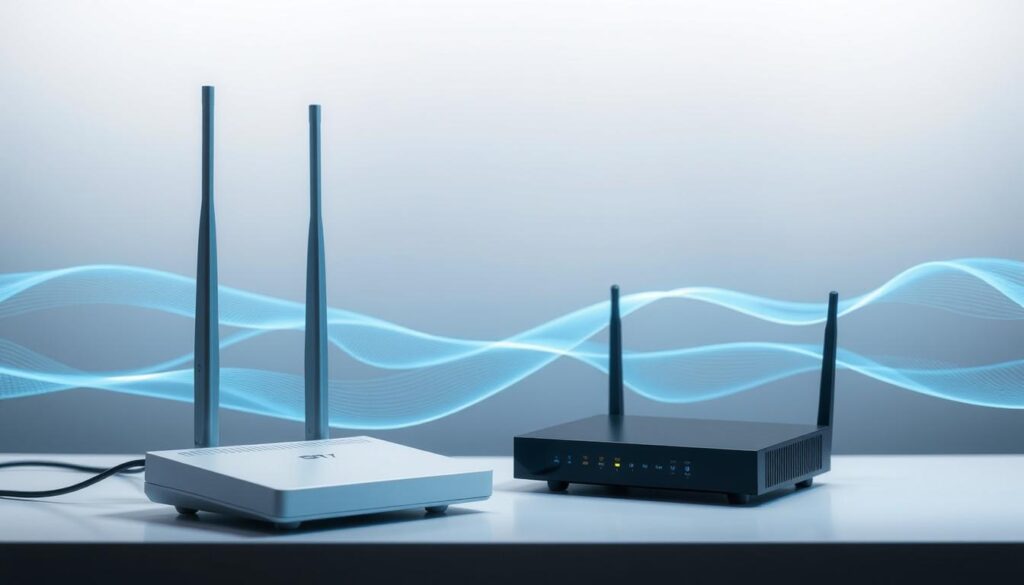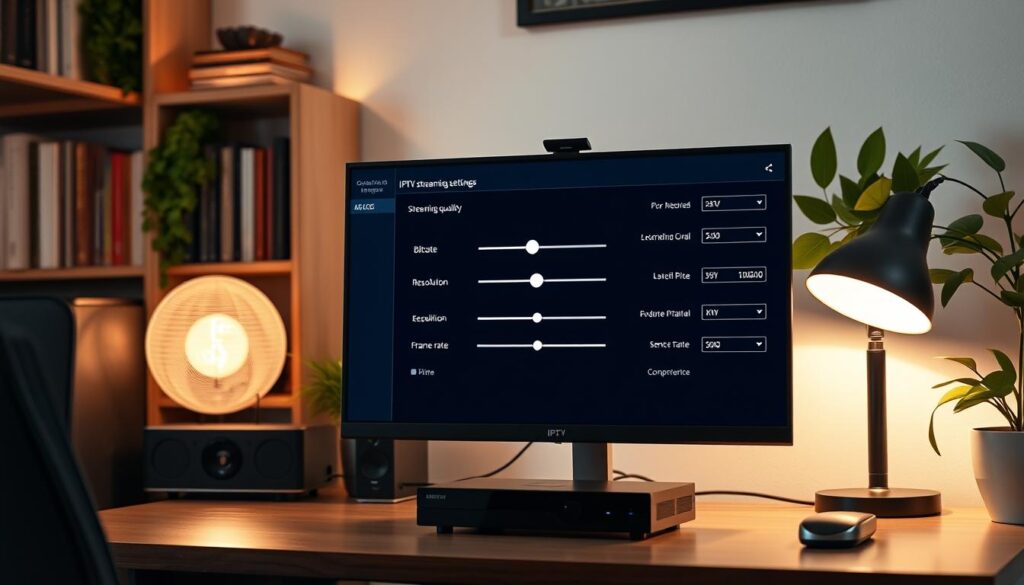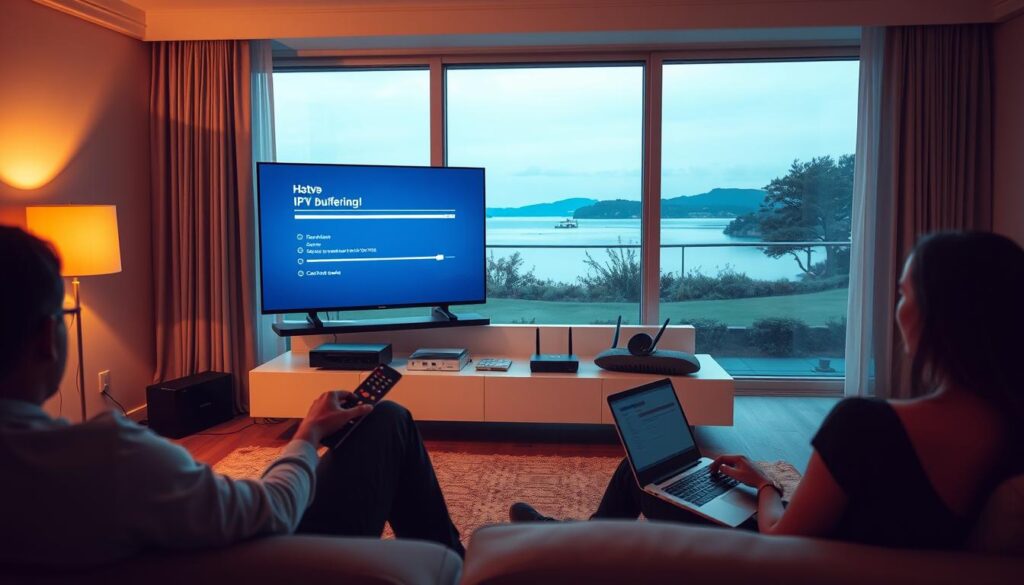Did you know that a big 70% of households in the United States are now using IPTV for fun? With IPTV getting more popular, having the right internet speed is key for no buffering.
To watch without breaks, the recommended internet speeds depend on the streaming quality. For example, 4K Ultra HD needs a speed of 25-30 Mbps. Make sure your internet plan is up to speed for uninterrupted shows.
Want to stream IPTV without buffering? Try your free IPTV trial now. Enjoy 1 full month of top streaming for just $6.95 at https://GetMaxTV.com.
Key Takeaways
- A stable and fast internet connection is necessary for IPTV streaming.
- The recommended internet speed for 4K IPTV is 25-30 Mbps.
- Lower internet speeds can result in buffering and poor streaming quality.
- Checking your internet plan can help ensure a smooth IPTV experience.
- GetMaxTV offers a free IPTV trial for premium streaming.
Understanding IPTV and Its Requirements
Getting to know IPTV is vital for a smooth streaming experience. IPTV, or Internet Protocol Television, lets users stream TV over the internet. It has changed how we watch media, making it flexible and personal.
What is IPTV?
IPTV sends TV channels and on-demand content over broadband. It’s different from old satellite or cable TV. This way, you get a interactive and customizable viewing experience. You can pick what to watch and see it on various devices, as long as you have internet.
How IPTV Works
IPTV sends TV and on-demand content over the internet. It needs a stable and fast internet connection for smooth delivery. The quality of IPTV depends a lot on your internet speed.
To reduce IPTV buffering, you need a reliable and fast internet. Picking the best ISP for IPTV can make a big difference. It ensures you watch your favorite shows without any problems.
Importance of Internet Speed for IPTV
A fast and reliable internet connection is key for top-notch IPTV streaming. The speed of your internet greatly affects the streaming quality. This makes it a vital factor for a smooth viewing experience.
Why Internet Speed Matters
Internet speed is vital for IPTV as it affects how fast data is sent to your device. For 4K IPTV streaming, you need at least 25 Mbps internet speed. This ensures a buffer-free and smooth viewing experience. Slow speeds can cause buffering, lag, and poor video quality, ruining the IPTV experience.
If your internet speed is too low, you might face interruptions, pixelation, or even lose the signal. This is a big problem for live IPTV streaming, where data needs to be transmitted in real-time.
Impact of Low Speed on Streaming Quality
A low internet speed can really hurt the quality of IPTV streaming. For example, a slow speed might lead to:
- Buffering and lag
- Poor video quality
- Intermittent signal loss
To get the best IPTV and internet speed for streaming, you need a connection that meets the minimum for your streaming quality. Upgrading your internet or optimizing your network can greatly improve your IPTV experience.
Recommended Internet Speeds for IPTV
For a smooth IPTV experience, knowing the right internet speeds is key. The correct speed lets you enjoy your favorite shows and movies without buffering.
Minimum Requirements for Standard Streaming
For standard definition (SD) streaming, you need 3-5 Mbps of internet speed. This is enough for basic streaming and great for beginners or those with small internet plans.
Suggested Speeds for HD and 4K Streaming
For high definition (HD) or 4K streaming, you’ll need faster speeds. HD streaming requires 5-8 Mbps, while 4K needs 25-30 Mbps. These speeds ensure your content looks great without interruptions.
To reduce IPTV buffering and have a smooth viewing experience, pick an internet plan that meets these speeds. Also, choosing the best ISP for IPTV can greatly improve your streaming experience.
Here are some key considerations for choosing the right internet speed for IPTV:
- Check your current internet speed to ensure it meets the minimum requirements for your preferred streaming quality.
- Consider upgrading your internet plan if you find that your current speed is not sufficient for smooth streaming.
- Opt for a reliable ISP that is known for supporting IPTV services without significant buffering or lag.
Factors Influencing Streaming Quality
Getting high-quality IPTV streaming depends on several key factors. Your streaming quality can change based on your internet connection and the device you use.
Network Congestion
Network congestion happens when too many devices use the same network. This can lead to bandwidth issues and poor streaming quality. It’s a big problem in homes with many users streaming at once.
Impact of Network Congestion: A congested network can really hurt your streaming quality. You might see pixelation, freezing, or even lose the signal completely.
| Number of Devices | Recommended Internet Speed | Streaming Quality |
|---|---|---|
| 1-2 Devices | 25 Mbps | HD Streaming |
| 3-5 Devices | 50 Mbps | Full HD Streaming |
| More than 5 Devices | 100 Mbps or more | 4K Streaming |
Wi-Fi Versus Wired Connections
The kind of internet connection you have affects your IPTV streaming quality. Wi-Fi is convenient but can have interference and signal loss. Wired connections are stable and reliable.
Benefits of Wired Connections: A wired Ethernet connection can lower buffering risks. It gives a smoother streaming experience, even for high-definition content.

Testing Your Internet Speed
To enjoy IPTV without interruptions, it’s essential to test your current internet speed. This step helps determine if your connection meets the requirements for smooth streaming.
Measuring Your Current Internet Speed
Testing your internet speed is straightforward. You can use online speed test tools available on websites like Speedtest.net or Fast.com. These tools measure your download and upload speeds, providing a clear picture of your internet connection’s performance.
To get accurate results, ensure that:
- No other devices are using your internet connection during the test.
- You use a device connected directly to your router via Ethernet for the most reliable results.
Interpreting Speed Test Results
Once you’ve conducted the speed test, compare your results with the recommended internet speeds for IPTV streaming. For standard streaming, a minimum of 5 Mbps is recommended. HD streaming requires at least 15 Mbps, and 4K streaming needs 25 Mbps or more.
| Streaming Quality | Recommended Speed |
|---|---|
| Standard | 5 Mbps |
| HD | 15 Mbps |
| 4K | 25 Mbps or more |
If your internet speed is below the recommended threshold, consider upgrading your plan or optimizing your network to reduce IPTV buffering. Choosing the best ISP for IPTV can also make a significant difference in your streaming experience.
Optimal Settings for IPTV Streaming
To get the best out of IPTV streaming, you need more than just fast internet. You also need to set up your device right. Making a few tweaks can really boost your streaming quality.
Adjusting Quality Settings
Changing the quality settings is a key way to improve your IPTV experience. Most services let you pick the video quality. This is great if your internet isn’t fast enough for HD or 4K.
For example, if your internet can’t handle 4K, try lowering it to HD or SD. This can make your stream smoother and stop buffering.

Utilizing VPNs for Better Performance
Using a Virtual Private Network (VPN) can also help your IPTV streaming. VPNs are known for privacy and security. But they can also help avoid ISP throttling, which slows down your internet.
But, not all VPNs are good for streaming. Some might slow down your internet or increase latency. Look for VPNs that are made for streaming and improve quality.
By adjusting your quality settings and using a good VPN, you can greatly improve your IPTV streaming. You’ll get to enjoy your favorite shows without buffering or poor quality.
How to Improve Your Internet Speed
To enjoy IPTV without buffering, you need a faster internet. A quicker and more stable connection makes streaming better. It becomes smoother and more fun.
Upgrading Your Internet Plan
Upgrading your internet plan is a great way to boost speed. If buffering happens a lot, it’s time for a faster plan. Check with your ISP to see if they offer faster plans that support IPTV streaming well.
Think about how many devices you connect and what you stream. For 4K content, you need a much faster connection than for standard definition. Consulting with your ISP can help find the best plan for you.
Positioning Your Router Effectively
Your router’s location affects your internet speed and connection. To get the best Wi-Fi, place your router in a central location in your home or office. Don’t put it near walls or in corners, as it weakens the signal.
Other devices can also mess with your Wi-Fi. Keep your router away from devices like cordless phones, microwaves, and neighboring Wi-Fi networks to avoid interference and improve speed.
By using these tips, you can cut down on IPTV buffering and have a better streaming experience. It’s also important to pick the best ISP for IPTV for reliable and fast connections.
Common IPTV Issues and Solutions
Streaming IPTV can be smooth if you know how to fix common problems like buffering and delays. IPTV uses your internet to stream content. Most issues come from slow internet or network problems.

Buffering Problems and Their Fixes
Buffering is a big problem for IPTV users. It happens when your internet is too slow to stream content well. To reduce IPTV buffering, first check your internet speed. You need at least 5 Mbps for standard streaming and 25 Mbps for HD.
If your speed is okay, the problem might be your network. Network congestion occurs when too many devices use the same network. Try disconnecting devices you don’t need.
“A stable and fast internet connection is the backbone of a smooth IPTV streaming experience.”
Addressing Streaming Delays
Streaming delays can be as bad as buffering. These delays often come from too many users on the server or problems with your IPTV provider. Try switching to a different server if you can. Also, using a VPN can help by reducing server load and latency.
It’s also key to adjust your IPTV settings. Lowering video quality can help your internet handle the stream better. Most IPTV services let you change these settings in their apps or software.
- Check your internet speed and upgrade if necessary.
- Use a wired connection instead of Wi-Fi for a more stable link.
- Adjust your IPTV settings to lower video quality during peak usage times.
By tackling these common IPTV problems, you can make your streaming better. Regularly check your internet speed and tweak your settings to enjoy a smooth viewing experience.
Choosing the Right IPTV Service
Finding the best IPTV service is all about matching it to your needs. With many choices out there, it’s key to think about a few important things before you decide.
Popular IPTV Providers Reviewed
Many IPTV providers are known for their wide range of channels and steady streaming. You might want to look at IPTV services reviewed on FirestickTricks or check out high-quality IPTV services on GetMaxTV. These sites offer great info on the top IPTV services.
When looking at IPTV providers, think about the channels they offer. Look for sports, entertainment, and international content. A good service should have a variety of channels to suit different tastes.
Features to Look for in an IPTV Service
When picking an IPTV service, there are a few key things to look for. First, check the streaming quality. Make sure it supports HD or 4K. Also, the service should be easy to use and have good customer support.
Another thing to think about is the internet speed requirement. Make sure your internet can handle the IPTV service’s streaming. For the best experience, you’ll want fast and stable internet. Check if your current ISP is among the best isp for iptv to get the best performance.
- Reliable streaming with minimal buffering
- Extensive channel lineup
- Support for various devices
- Good customer service
By considering these points and looking at popular IPTV providers, you can choose wisely. The right IPTV service and good internet speed will make your streaming top-notch.
Future Trends in IPTV and Internet Speeds
IPTV is on the verge of a big change, thanks to faster internet and new streaming tech. We’re expecting better IPTV services soon. They will make watching shows and movies smoother and more fun.
Advancements in Streaming Technology
New streaming tech is a big reason for this change. New codecs and protocols mean better, less interrupted streams. For example, HEVC (High Efficiency Video Coding) lets us stream in 4K and 8K with less bandwidth.
Adaptive bitrate streaming also plays a key role. It changes the stream’s quality based on your internet speed. This keeps the stream smooth, even for 4K IPTV which needs fast internet.
The Role of 5G in IPTV
5G networks are also changing IPTV. They offer faster speeds and lower latency. This means you can watch high-definition IPTV on mobile devices without needing a fixed internet connection.
5G’s low latency is great for live streaming. It cuts down on delay, making live events and sports feel more real-time. This means less buffering and a better viewing experience.
As these techs keep improving, IPTV will become even more important in our lives. The future of IPTV looks bright, with better streaming and 5G networks leading the way.
Conclusion: A Smooth Streaming Experience
Having a stable and fast internet connection is key for a great IPTV streaming experience. The right speed makes a big difference. It lets you enjoy your favorite shows and movies without any buffering.
Key Takeaways
For standard IPTV streaming, a minimum internet speed is needed. But, for HD and 4K content, you need even higher speeds. Things like network congestion and your internet connection type can also affect streaming quality.
Tips for Buffering-Free IPTV
To avoid buffering, think about upgrading your internet plan to a faster one. Also, place your router well and use a wired connection over Wi-Fi. Choosing the best ISP for IPTV can also improve your streaming.
Ready to make your streaming better? Get your free IPTV trial now. Enjoy 1 full month of premium streaming for just $6.95 at https://GetMaxTV.com. With the right speed and iptv, you can stream your favorite content without any issues.
FAQ
What is the recommended internet speed for 4K IPTV streaming?
For smooth 4K IPTV streaming, you need at least 25 Mbps. But, 50 Mbps or more is better. This ensures other devices on your network don’t slow it down.
How can I reduce IPTV buffering?
To cut down on IPTV buffering, make sure your internet is stable and fast. If it’s not, consider upgrading your plan. Use a wired connection instead of Wi-Fi. Also, try lowering your IPTV quality settings to a lower resolution.
What is the best ISP for IPTV?
The top ISP for IPTV varies by location and your needs. Look for ISPs with fast, low-latency plans. Fiber-optic connections are usually the best for streaming.
What internet speed do I need for IPTV?
Internet speed for IPTV depends on the quality you want. For SD, 3-5 Mbps is enough. HD needs 8-15 Mbps. For 4K, aim for 25 Mbps or more.
How do I test my internet speed for IPTV?
Use online speed test tools to check your internet speed. Your ISP or third-party websites offer these tools. They help ensure your speed meets IPTV quality needs.
Can a VPN improve my IPTV streaming experience?
A VPN might help by avoiding ISP throttling. But, it could also add latency. The impact depends on the VPN service and your situation.
What factors can influence IPTV streaming quality beside internet speed?
Other factors include network congestion and your connection type (wired or Wi-Fi). Your router’s quality also plays a role in IPTV streaming quality.
How can I optimize my router for IPTV streaming?
To improve your router for IPTV, place it centrally. Keep it updated with the latest firmware. Use Quality of Service (QoS) settings to give IPTV priority.



